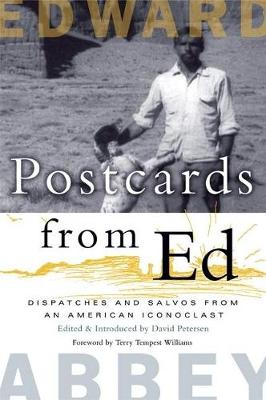
"But hell, I do like to write letters. Much easier than writing books."
And write letters Edward Abbey-"the Thoreau of the American West" (Washington Post)-did. At once incendiary and insightful, cantankerous and profoundly perceptive, Abbey was a singular American writer and cult hero, as famous for books like Desert Solitaire and The Monkey Wrench Gang as he was infamous for the persona of "Cactus Ed." A true iconoclast with a rich sense of humor, his polemics and salvos-Wallace Stegner once likened Abbey to the "stinger of a scorpion"-were not limited to any one arena.
Abbey's postcards and letters, legendary during his lifetime, convey the fullness of the man and reveal, along with his wisdom and savage wit, a tender side seldom seen before. For readers new to Abbey, this collection is an awe-inspiring introduction to the man and his works. And for devoted fans, the letters chronicle his evolution as an authentic American voice in the wilderness.
“Halpern did invite me (twice) to contribute something to that Antaeus anthology but said it had to be ‘non-controversial.’ How could anything non-controversial be of intellectual interest to grown-ups? He didn’t explain so I didn’t contribute.”
High five, Ed Abbey. Not a note here that hasn’t got some gem in it, some wisecrack, some grenade, some spark. Everything here from raw coal to sharp diamonds and I shouldn’t have to say that the diamonds aren’t necessarily the most valuable of the two. I’m thinking there’s something to what Abbey calls his shotgun method. Not every idea’s got to hit the mark but that’s how you blast away the mark with the ones that do. And, get plenty of raw fodder from the misses— including whether they really do miss at all.
Or, whether they don’t hit the heart of something more interesting.
That’s all my tortured metaphor, not his. Abbey uncensored would be much more interesting than that.
“If it appears hyperbolic to reviewers it is only because most American writers have allowed themselves to be muffled by the bland, suffocating, self-censoring politesse of our hypersensitive taboo-ridden decade. I think we need some plain speech and blunt talk and a facing up to the truth in this guilt-neurotic country. And some tolerance for humor.”
Reading updates
-
Started reading
-
14 January, 2014:
Finished reading
-
14 January, 2014:
Reviewed
